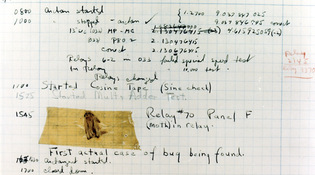 loading
loading
Arts & CultureYou can quote themYale law librarian Fred R. Shapiro is editor of the Yale Book of Quotations.  Courtesy Naval Surface Warfare CenterThis page from the September 9, 1947, log book of computer scientist Grace Murray Hopper ’34PhD is preserved in the Smithsonian Institution, with the bug she removed from Harvard's Mark II computer taped to it, still intact. View full imageIn a previous column, I wrote: “Etymology is the -ology that gets no respect.” Research into early usages of words and phrases can produce hard evidence that often proves or disproves theories about derivation. Yet word lovers delight in colorful derivation stories and find it hard to let them go. In 1963–4 Allen Walker Read published a landmark series of articles in the journal American Speech, demonstrating that the earliest citations for the term OK derive it from oll korrect—part of a craze for jocular abbreviations in the late 1830s. Yet, in the media and the popular mind, OK is frequently said to come from Old Kinderhook or a word in an African or Native American language. Similarly, the word hooker, meaning “prostitute,” has been shown to predate the career of Civil War general Joseph Hooker, and the phrase in like Flynn has been documented earlier than Errol Flynn’s trial for statutory rape, but claims of derivation from the names of the general and the actor continue to flourish. The supposed etymology of crap from the sanitary engineer Sir Thomas Crapper marches on despite the fact that it stems from Wallace Reyburn’s book Flushed with Pride, which was a hoax, and the fact that the Oxford English Dictionary records crap from as early as 1846, when Sir Thomas was nine years old. Possibly the most widespread etymythology of our time concerns the computer terms bug and debug. The tale traces these terms to a moth found inside an early computer by the pioneering computer scientist Grace Murray Hopper ’34PhD, whose real accomplishments include developing the first compiler for a programming language. Here is a typical recital: One day in the 1940s, Harvard's famed Mark I—the precursor of today's computers—failed. When the Harvard scientists looked inside, they found a moth that had lodged in the Mark I’s circuits. They removed the moth with a pair of tweezers, and from then on, whenever there was a problem with the Mark I, the scientists said they were looking for bugs. The term has stuck. —Dun’s Business Month, Feb. 1983 Hopper and her colleagues did find a moth in the Mark II (not the Mark I). It is preserved at the Smithsonian, taped to Hopper’s log of September 9, 1947. However, the claim that computer defects are called bugs because of this moth is easily refuted. On November 18, 1878, Thomas Alva Edison wrote to Theodore Puskas, “It has been just so in all my inventions. The first step is an intuition—and comes with a burst, then difficulties arise. This thing gives out and then that—‘Bugs’—as such little faults and difficulties are called—show themselves.” There are other nineteenth-century references, by Edison and others, to mechanical “bugs.” Further, Hopper clearly thought the moth noteworthy because mechanical defects were already called “bugs”: her 1947 log entry reads, “First actual case of bug being found.” And Smithsonian curator Peggy Aldrich Kidwell ’79PhD has shown that Hopper herself used both bug and debug, and even drew cartoons of bugs, in her papers from the mid-1940s. I published several articles about the Edison evidence in the 1980s and 1990s. Compared with most debunkings, the bug research was extensively publicized—covered by the New York Times and picked up by the widely disseminated Hacker’s Dictionary. But last year alone, the moth myth was repeated in the Pittsburgh Post-Gazette, National Public Radio, and Computerworld, among others. And earlier, on March 23, 2000, Joe Trela was asked, “What insect shorted out an early supercomputer and inspired the term ‘computer bug’?” His answer, “a moth,” made him the third person ever to win a million dollars on Who Wants to Be a Millionaire.
The comment period has expired.
|
|